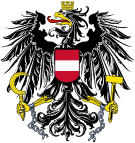You can help expand this article with text translated from the corresponding article in German. (November 2022) Click for important translation instructions.
|
| This article is part of a series on the |
| Politics of Austria |
|---|
 |
| Law |
|
Executive
|
|
Legislature Wöginger • Rendi-Wagner • Kickl • Maurer • Meinl-Reisinger •
|
Judiciary
|
Elections
|
Political parties
|
Federal states
|
A non-binding referendum on ending conscription was held in Austria on 20 January 2013. The proposal was supported by the Social Democratic Party and the Green Party and opposed by the Austrian People's Party and the FPÖ. Though constitutionally not obliged to act on, both parties in government stated that they would honour the results.
The motion to end conscription and introduce a professional army was rejected.
Background
Austria is one of the few members of the European Union to still retain compulsory military service, with others in 2013 including Cyprus, Estonia, Finland and Greece. Service in the Austrian Armed Forces is mandatory for all Austrian males older than 18, with around 22,000 males annually being drafted into six months of service in 2012. Conscription in Austria however allows conscripts to opt-out of military service and instead choose civic and community service as an alternative. Conscripts in the armed forces support efforts during natural disasters.
Positions
Parliamentary parties
Social Democratic Party (SPÖ)
Norbert Darabos, then current Ministry of Defence, supported the proposal saying that conscription was outdated in a modern world with counterterrorism and cybercrime, with the shift of the armed forces into a professional army as being necessary due to change in threats.
Austrian People's Party (ÖVP)
Johanna Mikl-Leitner, the Minister of the Interior, criticized the proposal, calling it a "2-billion-euro castle in the sky", due to the perceived cost of creating a professional army. The ÖVP viewed conscription as essential to protecting Austrian sovereignty, and in supporting natural disaster relief efforts and social security. It also saw that a professional army would decrease the armed force's quality and increase its cost. ÖVP would come to view the referendum as being more about social and health security in Austria then about conscription.
Other organizations
- Katholische Jungschar: the organization's chairperson Noemi Müller, expressed mix feelings towards the referendum, stating their opposition to conscription but their reluctance to end the compulsory civic service that came with conscription.
Results

| Choice | Votes | % | |
|---|---|---|---|
| For | 1,315,278 | 40.32 | |
| Against | 1,947,116 | 59.68 | |
| Total | 3,262,394 | 100.00 | |
| Valid votes | 3,262,394 | 97.54 | |
| Invalid/blank votes | 82,226 | 2.46 | |
| Total votes | 3,344,620 | 100.00 | |
| Registered voters/turnout | 6,378,478 | 52.44 | |
| Source: Ministry of the Interior | |||
References
- Austrians vote to keep compulsory military service BBC News, 20 January 2013
- Austrians Appear to Reject Changes to Conscript Army New York Times, 20 January 2013
- ^ "Austrians keep conscription – DW – 01/20/2013". dw.com. Retrieved 3 January 2024.
- ^ "Battle begins – DW – 09/07/2012". dw.com. Retrieved 3 January 2024.
- ^ "Ja - zu Wehrpflicht, Zivildienst und Katastrophenschutz". 19 January 2013. Archived from the original on 19 January 2013. Retrieved 3 January 2024.
- "Kostenlos, anonym - bald Geschichte? Rat auf Draht muss bleiben! - Katholische Jungschar ED Wien". wien.jungschar.at. Retrieved 3 January 2024.
| |||||||||||
| |||||||||||


